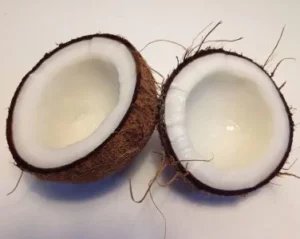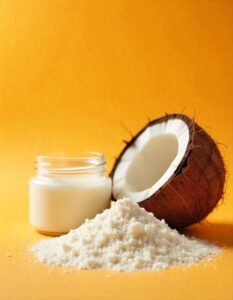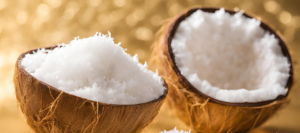Indian Coconuts: Exporting Wellness from Nature’s Treasure Trove
Meta Title: Indian Coconuts: Exporting Wellness from Nature’s Treasure Trove

Coconuts are not just another fruit; they are a treasure trove of wellness hidden within their humble shells. And when it comes to coconuts, India is undoubtedly a leading exporter of this natural wonder. With its rich biodiversity, favorable climate, and a deep-rooted tradition of coconut cultivation, India proudly supplies the world with high-quality mature coconuts and an array of coconut byproducts. In this article, we explore the journey of Indian coconuts, from cultivation to export, and why they are an excellent choice for your wellness and culinary needs.
Cultivating the Finest Coconuts
India’s tropical climate, specific soil types, and abundant rainfall provide the perfect environment for coconut cultivation. Kerala, Tamil Nadu, and Karnataka are the major coconut-producing states in India. The coconut palms sway gracefully across acres of lush green lands, absorbing the goodness of nature and nurturing the finest coconuts.
Coconut trees take around 10 to 12 months to bear fruit. During this period, they absorb essential nutrients from the soil, resulting in coconuts with superior taste and nutritional value. The resinous husks protect the coconuts from external factors and ensure their freshness.

Exporting Mature Coconuts: The Process
Exporting mature coconuts from India involves a series of meticulous steps to ensure the quality and freshness of the fruit reach global markets. Let’s dive into this journey:
Harvesting: Skilled farmers climb the tall coconut trees and carefully pluck the mature coconuts. Their expertise ensures that the coconuts are harvested without any damage.
Sorting: The freshly harvested coconuts are sorted based on their size, weight, and quality. This step ensures that only the best coconuts are chosen for export.
Cleaning: Once sorted, the coconuts are meticulously cleaned to remove any dirt or impurities. This process guarantees that the exported coconuts are hygienic and adhere to international quality standards.
Packaging: The clean and wholesome coconuts are packed in specialized, eco-friendly packaging material to maintain their freshness during transit. These packaging materials are designed to safeguard the coconuts from external elements and ensure they reach their destination in optimal condition.
Quality Checks: Before shipment, the coconuts undergo stringent quality checks to ensure they meet the stringent international export regulations. These checks include evaluating size, weight, appearance, and internal quality.
Export: Once the coconuts pass the quality checks, they are ready for export. They are carefully loaded onto shipping containers, where they begin their journey to cater to the global demand for Indian coconuts.
Superior Coconut Byproducts: Nature’s Bounty
Apart from mature coconuts, India also excels in producing an extensive range of high-quality coconut byproducts. These byproducts offer a multitude of health benefits and are widely used in various industries such as food, beauty, and wellness. Here are some remarkable coconut byproducts:
Virgin Coconut Oil (VCO): VCO is gaining immense popularity worldwide due to its numerous health benefits. It is extracted from fresh coconut meat and is often referred to as the “healthiest oil on Earth.” VCO is rich in medium-chain fatty acids (MCFAs), which offer antioxidant, antimicrobial, and anti-inflammatory properties.
Coconut Flour: Coconut flour, made from dried coconut meat, is a gluten-free alternative to traditional wheat flour. Packed with fiber and essential nutrients, it adds a delightful flavor and texture to baked goods. It is also an excellent choice for individuals following a paleo or grain-free diet.
Coconut Milk: Coconut milk, extracted from the grated meat of mature coconuts, is a creamy and flavorful dairy substitute. It is widely used in curries, desserts, and beverages. With its rich content of essential minerals and healthy fats, coconut milk adds a unique taste and nutritional value to various dishes.
Coconut Sugar: Coconut sugar is a natural sweetener made from the sap of coconut palm flowers. It is unrefined, retains essential nutrients, and has a lower glycemic index compared to regular sugar. Its caramel-like flavor makes it a popular choice among health-conscious individuals.
“Coconuts are not just a superfood; they are nature’s way of providing us with wellness and nourishment.” – grofarm ug
The Global Demand for Indian Coconuts
Indian coconuts enjoy a significant demand worldwide. Their exceptional taste, superior quality, and diverse applications make them highly sought-after commodities. Numerous countries import Indian coconuts and coconut byproducts due to their reputation for excellence. Some of the key export destinations for Indian coconuts include the United States, the United Kingdom, Saudi Arabia, and the United Arab Emirates.
Embrace the Wellness of Indian Coconuts
Indian coconuts are more than just a delicious tropical treat; they are a potent source of wellness. From their refreshing water to nutrient-rich meat and versatile byproducts, coconuts offer a holistic approach to overall health. By choosing Indian coconuts and their byproducts, you not only gain access to nature’s bounty but also support sustainable farming practices and contribute to the local economy.
So, why wait? Embrace the wellness of Indian coconuts and experience the goodness they have to offer. Let the journey from India’s coconut farms to your plate fill your life with the richness of nature.
External links:
– grofarm ug – Official Website
– Benefits of Virgin Coconut Oil



